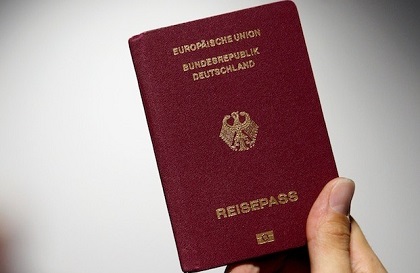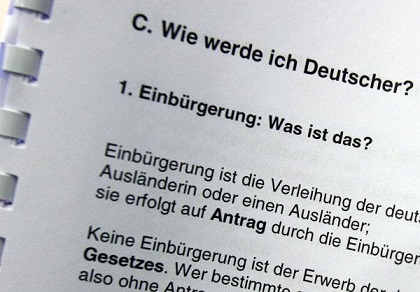 On January 1, 2000 a new nationality law came into force in Germany. This law will help foreigners living in Germany to become German citizens. According to the new law, “At the heart of the reform is the supplementing of the traditional principle of descent (jus sanguinis) by the acquisition of nationality by birth. For children born in Germany of foreign parents, this makes it easier for them to identify with their home country of Germany. They are given the chance to grow up as Germans among Germans.” Until now citizenship was identified according to the principle of descent. From now on the only thing that matters is the place of birth, like in many other European countries.
On January 1, 2000 a new nationality law came into force in Germany. This law will help foreigners living in Germany to become German citizens. According to the new law, “At the heart of the reform is the supplementing of the traditional principle of descent (jus sanguinis) by the acquisition of nationality by birth. For children born in Germany of foreign parents, this makes it easier for them to identify with their home country of Germany. They are given the chance to grow up as Germans among Germans.” Until now citizenship was identified according to the principle of descent. From now on the only thing that matters is the place of birth, like in many other European countries.
The German government estimates around half of the foreigners living in Germany will become eligible for citizenship under the new law. All children born in Germany will now automatically receive citizenship, if at least one of their parents has lived in Germany for eight years. The children of foreign parents will be entitled to dual citizenship until they are 23, at which point they must choose. Also, a person must fulfill certain conditions – be loyal to Germany and its people, and have a good command of the German language.
Birth in Germany
Children born on or after 1 January 2000 to non-German parents acquire German citizenship at birth if at least one parent:
- has a permanent residence permit and
- has been residing in Germany for at least eight years.
In order to retain German citizenship, such children are required to take affirmative measures by age 23, after which their German citizenship otherwise expires. Assuming that this law is not changed or overturned by a court, these affirmative measures include an applicant’s proving that he or she does not hold any foreign citizenship other than in a European Union member nation or a nation such as Morocco, Nigeria, or Iran whose domestic law provides that citizenship in it cannot be lost.
Descent from a German parent
A person born of a parent with German citizenship at the time of the child’s birth is a German citizen. Place of birth is not a factor in citizenship determination based on parentage.
- Those born after 1 January 1975 are Germans if the mother or father is a German citizen.
- Those born before 1 January 1975 could normally only claim German citizenship from the father and not the mother. Exceptions included cases where the parents were unmarried (in which case German mothers could pass on citizenship) or where the German mother applied for the child to be registered as German on or before 31 December 1977.
- Special rules exist for those born before 1 July 1993 if only the father is German and is not married to the mother. The father must acknowledge paternity and must have married the mother before 1 July 1998.
- A child born in a foreign country will no longer receive German citizenship automatically by birth, if his/her German parent was born after 31 December 1999 in a foreign country and has his/her primary residence there. Exceptions are:
1. The child would be stateless.
2. The German parent registers the child’s birth within one year of birth to the responsible German agency abroad. - In case both parents are German citizens, German citizenship will not be passed on automatically, if both parents were born abroad after 31 December 1999 and have their primary residence outside of Germany. Exceptions are same as the above.
- Those born in Germany and adopted to a foreign country would need to contact their local German Consulate for clarification of German citizenship.
Persons who are Germans on the basis of descent from a German parent do not have to apply to retain German citizenship by age 23. If they acquire another citizenship at birth, they can usually continue to hold this.
An individual who fulfils all of the following criteria has an entitlement to naturalise as a German citizen:
- he/she has been ordinarily resident in Germany for at least 8 years (this period can be reduced – see below)
- he/she has legal capacity or a legal representative
- confirms his/her present and past commitment to the free democratic constitutional system enshrined in the German Basic Law (or that he is presently committed to such principles and has departed from former support of ideas contrary to such principles)
- he/she is a European Union or Swiss citizen in possession of the appropriate residence permit which permits the free movement of persons OR is a non-EU/Swiss citizen who has been granted a permanent right of residence
- he/she is able to support himself/herself without recourse to benefits
- he/she has not been sentenced for an unlawful act and is not subject to any court order imposing a measure of reform and prevention
- he/she possesses an adequate knowledge of German
- possesses knowledge of the legal system, the society and living conditions in the Federal Republic of Germany
An individual who does not have legal capacity is entitled to naturalise as a German citizen merely through ordinary residence in Germany for at least 8 years – he/she does not have to fulfil the other criteria (e.g. adequate command of the German language and ability to be self-supporting without recourse to benefits).
Applicants for naturalisation are normally expected to prove they have renounced their existing nationality, or will lose this automatically upon naturalisation. An exception applies to those unable to give up their nationality easily (such as refugees). A further exception applies to citizens of Switzerland and the European Union member states.
An individual who is entitled to naturalise as a German citizen can also apply for his/her spouse and minor children to be naturalised at the same time (his/her spouse and minor children need not have ordinarily resided in Germany for at least 8 years).
Exceptions to the normal residence requirements include:
- persons who have completed an integration course may have the residence requirement reduced to 7 years
- If a person shows that he/she is especially well integrated and has a higher level of command of the German language than the basic requirement for the German citizenship (i.e., higher than CEFR level B1) may have the residence requirement reduced to 6 years
- The spouse of a German citizen may be naturalised after 3 years of continual residency in Germany. The marriage must have persisted for at least 2 years.
- refugees and stateless persons may be able to apply after 6 years of continual residency
- former German citizens
Related articles:
How to Get German Citizenship
German Dual Citizenship
How to Move to Germany
How to Get a Work Permit for Germany
Strange German Laws You Won’t Believe Still Exist








